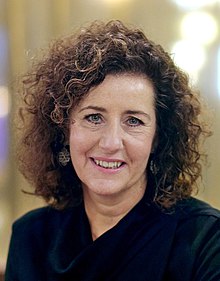Ingrid van Engelshoven | |
|---|---|
 Van Engelshoven in 2017 | |
| Minister of Education, Culture and Science | |
| In office 26 October 2017 – 10 January 2022 | |
| Prime Minister | Mark Rutte |
| Preceded by | Jet Bussemaker |
| Succeeded by | Robbert Dijkgraaf |
| Member of the House of Representatives | |
| In office 23 March 2017 – 26 October 2017 | |
| Chairwoman of the Democrats 66 | |
| In office 12 May 2007 – 9 March 2013 | |
| Leader | Alexander Pechtold |
| Preceded by | Gerard Schouw (ad interim) |
| Succeeded by | Fleur Gräper |
| Personal details | |
| Born | Ingrid Katharina van Engelshoven 12 July 1966 Delfzijl, Netherlands |
| Political party | Democrats 66 (since 1986) |
| Children | 1 daughter |
| Residence(s) | The Hague, Netherlands |
| Alma mater | Radboud University Nijmegen (Bachelor of Social Science, Master of Social Science) Leiden University (Bachelor of Laws, Master of Laws) |
| Occupation | Politician · Civil servant · Jurist · Management consultant · Political consultant |
Ingrid Katharina van Engelshoven (born 12 July 1966) is a Dutch politician who served as Minister of Education, Culture and Science in the Third Rutte cabinet from 26 October 2017 until 10 January 2022.[1][2]
A member of Democrats 66 (D66) party, she was the party chairwoman from 12 May 2007 until 9 March 2013; before her election to the House of Representatives in 2017, she had been an alderwoman in The Hague, from 26 June 2014 to 16 February 2017. Van Engelshoven studied political science at Radboud University Nijmegen and law at Leiden University. On 26 October 2017, she was appointed as Minister for Education, Culture and Science in Mark Rutte's third cabinet, the first member of her party to hold the position.
Feminism
[edit]According to Van Engelshoven, there are too many "white men" working at colleges and universities in the Netherlands.[3] She has claimed that this leads to "nasty incidents involving intimidation of female employees".[3] She has qualified the decision of the TU Eindhoven to no longer accept men for new vacancies as "courageous".[4] The Dutch Institute for Human Rights later ruled that this decision violates Dutch equality laws.[5]
References
[edit]- ^ "Minister Ingrid van Engelshoven (D66) 'reanimeerde' de partij" (in Dutch). NOS. 23 October 2017. Retrieved 11 March 2019.
- ^ "Mr.Drs. I.K. (Ingrid) van Engelshoven" (in Dutch). Parlement.com. Retrieved 10 January 2022.
- ^ a b "Van Engelshoven en universiteiten willen meer diversiteit hoger onderwijs". nos.nl (in Dutch). September 2020. Retrieved 2020-12-05.
- ^ Tweede Kamer der Staten-Generaal (2019-07-16). "Emancipatiebeleid; Verslag van een algemeen overleg; Verslag van een algemeen overleg, gehouden op 18 juni 2019, over emancipatiebeleid". zoek.officielebekendmakingen.nl (in Dutch). Retrieved 2020-12-05.
- ^ "College oordeelt over voorkeursbeleid TU Eindhoven | College voor de Rechten van de Mens". mensenrechten.nl (in Dutch). Retrieved 2020-12-05.
External links
[edit]- Official
- (in Dutch) Mr.Drs. I.K. (Ingrid) van Engelshoven Parlement & Politiek

